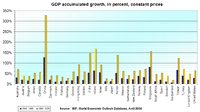
Upscaling Reverse Electrodialysis
Sign Up to like & getrecommendations! Published in 2018 at "Environmental Science & Technology"
DOI: 10.1021/acs.est.8b01886
Abstract: Salinity gradient energy is a sustainable, renewable, and clean energy source. When waters with different salinities are mixed, the change in Gibbs free energy can be harvested as energy and only brackish water remains. Reverse… read more here.
Keywords: reverse electrodialysis; thermodynamic efficiency; energy; upscaling reverse ... See more keywords

Thermodynamic efficiency evaluation of a low pressure turbo expander cryogenic cycle based on exergy analysis
Sign Up to like & getrecommendations! Published in 2019 at "Thermal Science"
DOI: 10.2298/tsci170406230r
Abstract: Thermodynamic analysis, using the exergy or entropy methods, is usually carried out for better insight into the physical meaning of the losses encountered in a cryogenic plant. From the results of such analysis, it is… read more here.
Keywords: cycle; thermodynamic efficiency; based exergy; cycle based ... See more keywords

Thermodynamic Efficiency Gains and their Role as a Key ‘Engine of Economic Growth’
Sign Up to like & getrecommendations! Published in 2018 at "Energies"
DOI: 10.3390/en12010110
Abstract: Increasing energy efficiency is commonly viewed as providing a key stimulus to economic growth, through investment in efficient technologies, reducing energy use and costs, enabling productivity gains, and generating jobs. However, this view is received… read more here.
Keywords: economic growth; thermodynamic efficiency; energy; efficiency gains ... See more keywords

Thermodynamic Efficiency Maximum of Simple Organic Rankine Cycles
Sign Up to like & getrecommendations! Published in 2021 at "Energies"
DOI: 10.3390/en14020307
Abstract: The increase of the maximal cycle temperature is considered as one of the best tools to increase cycle efficiency for all thermodynamic cycles, including Organic Rankine Cycles (ORC). Technically, this can be done in various… read more here.
Keywords: cycle; thermodynamic efficiency; temperature; efficiency ... See more keywords